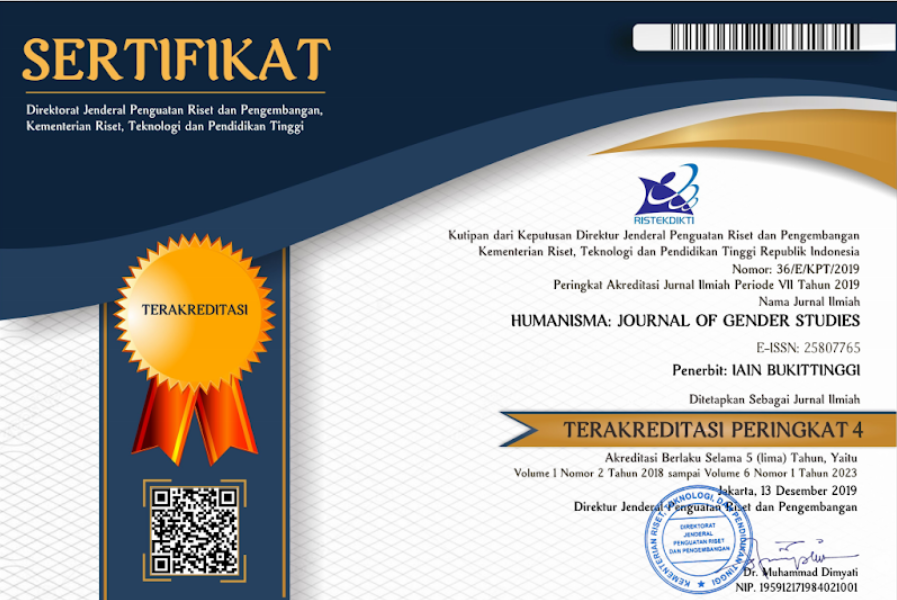CHALLENGES TO THE ENACTMENT OF THE ELIMINATION OF SEXUAL VIOLENCE BILL
DOI:
https://doi.org/10.30983/humanisme.v3i2.2557Keywords:
Komnas Perempuan, Elimination of Sexual Violence Bill (Rancangan Undang-Undang Penghapusan Kekerasan Seksual/RUU P-KS), sexual violence, Kitab Undang-Undang Hukum Pidana (KUHP).Abstract
Indonesia currently has only one criminal law, Kitab Undang-Undang Hukum Pidana (KUHP), which was enacted and inherited from our colonial government. There has been an effort to amend this law but up until now the amendment of this law is not enacted yet. In this law, there are only two types of sexual violence which have legal protection: rape and sexual molestation (pencabulan), while in the current reality, based on the reported cases to partners of Komnas Perempuan from 2001-2011, there are 15 types of sexual violence; and the number of sexual violence cases has been increasing. As a result, it is difficult for victims of the 15 types of sexual violence to have legal protection. This shows the existing hole in the lex generalis KUHP, which needs to be filled in by lex specialis law which specifically addresses sexual violence. Based on the need for legal protection for victims of various types of sexual violence and to protect women’s human rights, Komnas Perempuan and her partners have drafted the Elimination of Sexual Violence Bill since 2014. This Bill has become one of the priorities of the national legislation program since 2016, after the incidence of a gang rape to a school age child in Bengkulu. However, up until the end of September 2019, this Bill was not enacted yet. In addition, there has been currently opposition to this Bill from the conservative group, accusing that this Bill legalizes zina (extra marital sexual relationship) and LGBT. This paper aims at elaborating the background, aims, contents and challenges to the enactment of the Elimination of Sexual Violence Bill. I will argue that this Bill offers both procedural and substantive justice for women and the marginalized groups, the majority victims of sexual violence.
References
Aila (2018). “Daftar Inventaris Masalah RUU Penghapusan Kekerasan Seksualâ€, unpublished document, accessed by email from Asmaul Khusaeny, 27 June 2019.
Azriana (2019). “Urgensi Aksi Kolaborasi dalam Advokasi Rancangan Undang-Undang Penghapusan Kekerasan Seksual (RUU P-KS)â€, power point presented at Komnas Perempuan’s meeting with Forum Pengada Layanan on 16 May 2019.
Badan Pusat Statistik (2016) Statistik Indonesia Statistical Yearbook of Indonesia 2016. https://www.bps.go.id/publication/2016/06/29/7aa1e8f93b4148234a9b4bc3/statistik-indonesia-2016.html, accessed 16 May 2019.
Dewan Perwakilan Rakyat (2017). “Rancangan Undang-Undang Republik Indonesia tentang Penghapusan Kekerasan Seksualâ€, http://www.dpr.go.id/doksileg/proses2/RJ2-20170201-043128-3029.pdf, accessed 7 July 2019.
Diani, Hera (2016). “What you need to know about Anti-Sexual Violence Billâ€, https://magdalene.co/story/what-you-need-to-know-about-anti-sexual-violence-bill, accessed 28 June 2019.
Komnas Perempuan (2019) Catatan Tahunan Kekerasan terhadap Perempuan 2019. Jakarta: Komnas Perempuan.
Komnas Perempuan dan Forum Pengada Layanan (2017). Naskah Akademik Rancangan Undang-Undang tentang Penghapusan Kekerasan Seksual. Jakarta: Komnas Perempuan.
Wahyuningrum, Rima (2018). “Ini alasan terdakwa arak pasangan kekasih yang dituduh mesum di Cikupaâ€, Kompas 4 April, https://megapolitan.kompas.com/read/2018/04/04/06384681/ini-alasan-terdakwa-arak-pasangan-kekasih-yang-dituduh-mesum-di-cikupa?page=all, diakses 2 Juli 2019
Wicaksana, Dio Ashar (2019) “Catatan Tindak Pidana di dalam RKUHPâ€, power point presentation presented on 8 July 2019 in Sari Pacific Hotel, Jakarta.
Downloads
Submitted
Accepted
Published
Issue
Section
License
Authors who publish with this journal agree to the following terms:
- Authors retain copyright and grant the journal right of first publication with the work simultaneously licensed under a Creative Commons Attribution-ShareAlike 4.0. that allows others to share the work with an acknowledgment of the work's authorship and initial publication in this journal.
- Authors are able to enter into separate, additional contractual arrangements for the non-exclusive distribution of the journal's published version of the work (e.g., post it to an institutional repository or publish it in a book), with an acknowledgment of its initial publication in this journal.
- Authors are permitted and encouraged to post their work online (e.g., in institutional repositories or on their website) prior to and during the submission process, as it can lead to productive exchanges, as well as earlier and greater citation of published work (See The Effect of Open Access).



















